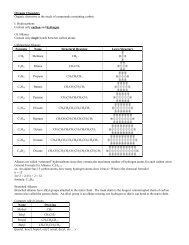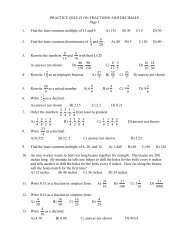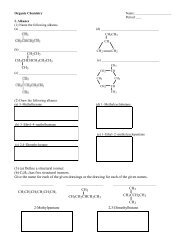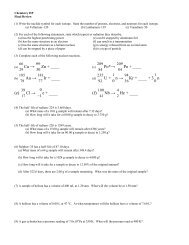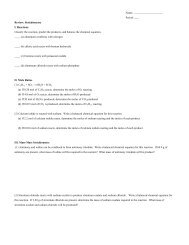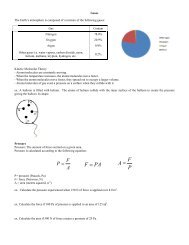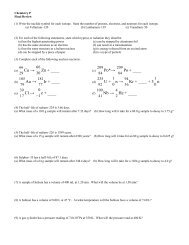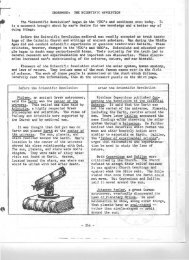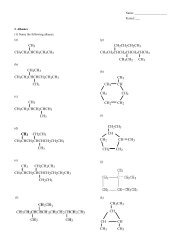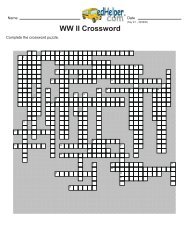Since workers didn’t really benefit as much as their employers did from the new conditions thelabor movement gained strength – but the employers fought back, too. Some even madecrappy products for the gov’t – i.e. corruption.Perhaps most importantly: the gov’t gained an activist role in the economy for good. This wassolidified by a series of <strong>Am</strong>erican System-ish acts passed [since no South to oppose]: Morrill Tariff Act (1861) – doubled former tariffs <strong>Home</strong>stead Act (1862) – 160 acres to anyone for 5 years free Legal Tender Act (1862) – creation of a nat’l currency Morrill Land Grant Act (1862) – land given to states to sell, but revenue can only gofor education [think agricultural, engineering schools]. Pacific RRD Act (1863) – transcontinental RRD planned National Bank Act (1863) – I hope this one is self-explanatoryLincoln’s power also increased – he started a shipbuilding program w/o waiting for Congress,suspended habeas corpus in the border states (first w/o Congress, then w/their approval) andeven invoked martial law.Lastly, Northern women took over jobs left vacant by soldiers.- And the South experienced even more disruption…*Emancipation*For one, the whole local/limited/states’ rights gov’t idea had to go in order to fight the warproperly. Davis moved quickly to bring arms, supplies and troops under his control, and thenhad to resort to the first ever draft law in April 1862. Davis was a strong executive – he evensuspended habeas corpus and imposed martial law where there was opposition.The government also ended up having big time influence on the economy, b/c of conscription,which allowed them to control labor – RRDs, industries all went under gov’t control. And due tothe Union blockade, the South actually started industrializing during the war.Southern women also had to take over tasks formerly reserved for men (like managing thefarm, new jobs, etc.) – which pleased some women but annoyed others.Then there was the whole food issue – there just wasn’t enough of it, mainly b/c of laborshortages [other goods were hard to get as well] – tremendous inflation resulted.Social tensions also increased due to the unfairness of the draft system.- Wait, what? Slaves? This was a war about slavery? You wouldn’t have guessed it given the way bothLincoln and Davis avoided mentioning the topic for the first months – Lincoln b/c of the border states andRepublican Party, and Davis b/c of the class conflicts [not all Southerners had slaves, remember].- Lincoln’s refusal to address the issue didn’t go over too well w/blacks and abolitionists, though, so inMarch 1862 he first proposed that states consider emancipation on their own [aid was promised, as was<strong>com</strong>pensation for slaveholders and colonization of former slaves in Africa]. This colonization scheme stuckaround until 1864 – again, not cool w/blacks and abolitionists.- Some Radicals Republicans (George Julian, Charles Sumner, Thaddeus Stevens), however, had otherplans – they created a special House-Senate <strong>com</strong>mittee on the war to pressure Congress, and then theypushed 2 confiscation acts through – in August 1861 [slaves used in hostile actions could be seized] and inJuly 1862 [property of rebels confiscated, so slaves freed in South].- But Lincoln stood by his voluntary gradual emancipation deal [Horace Greeley protested this in “ThePrayer of Twenty Millions”] until after the Battle of Antiedam. Then, in the famous EmancipationProclamation, which took effect on New Year’s Day, 1863 (and some say “nothing changes on New Year’sDay”) he freed all the slaves in the states in rebellion against the US.- The EP was actually more of a threat to the South, and was still sort of ambiguous, the message was clearto many – and it defined the war as one against slavery. It was about time, too!- The final thing came in June 1864 when Lincoln gave his support for a Constitutional ban on slavery,leading to the Republican Party’s call for the Thirteenth <strong>Am</strong>endment, which was passed in early 1865. As arather strange note, near the end of the war the Confederates grew so desperate even they consideredemancipating and arming the slaves. Go figure!*1863: The Decisive Year*- The year began well for the South w/the Battle of Chancellorsville, a crushing defeat for the North – butalso detrimental to the South b/c of the loss of Stonewall Jackson.- But things went downhill quickly for the South b/c of two important battles: the Battle of Vicksburg [on thelast major Southern fortification of the Mississippi] and the Battle of Gettysburg [the high water mark of theConfederate offensive into Maryland].38
- The two Northern victories at the above battles were very important. The fall of Vicksburg on July 4, 1863opened the Mississippi for the North and cut the South in half and the Northern victory at Gettysburg was theend of all Southern offensives.*Disunity in the North and South*- In the North (not as bad): Resentment of the draft was one problem, as was general disillusionment. However, the Northhad enough resources that the problems didn’t make an impact on the war effort overall. Most resistance, in fact, was political in origin. Some Democrats attempted to gain support byblaming Lincoln for the misfortunes brought about by the war, attacking conscription, anddefending states’ rights. These Peace Democrats [led by Clement L. Vallandigham] calledLincoln a dictator [got CV arrested for treason] – which led to Republicans calling them“Copperheads” [implication was that they were trying to sabotage war]. The worst incident of public violence came about against the draft [law in 1863] – the NewYork City Draft Riots, for example, showed the class and ethnic tensions of the time b/cblacks were the main target [taking jobs]. In the Presidential Election of 1864 the PD’s actually had somewhat of a chance – they ranformer General McClellan against Lincoln. He lost, but still…- In the South (a lot worse): One problem was the planters’ increasing opposition to their own gov’t. The centralizingtendencies needed to maintain the war effort were just not cool – so planters <strong>com</strong>plained aboutconscription, wouldn’t change to food from cash crops, and were generally inflexible. The food situation, which had never been good, certainly wasn’t getting better. This culminatedin the food riots in several Southern cities in spring 1863. Most Southerners resisted less conspicuously, though – by evading taxes and the draft, and bydeserting from the army. Davis was not good at <strong>com</strong>municating w/the public, so he was stuckw/the overriding problem of public apathy/lack of morale, esp. after Vicksburg and Gettysburg. Some Southern legislatures even began to call for peace after V&G – William Holden [no, notthe Sunset Bvld/Sabrina/Stalag 17 guy] in North Carolina (summer 1863) and Brown andStevens in Georgia (1864) – but the movements never got anywhere. Also, the 1863 elections hurt Davis as many supporters of his administration lost seats.Basically, by 1864 the South had given up and many were either doing nothing or activelysabotaging the Confederate gov’t.*1864 – 1865: The Final Stretch*- The South could actually have still won in the last year if they had kept up a stalemate and waited forNorthern anti-war sentiments to triumph. But several important events swayed things just enough the otherway to assure a Northern victory. One aspect was that the North’s diplomatic strategy, which was don’t-let-Europe-recognize-them, succeeded into 1864.- Also, General Sherman [“War is Hell”] took total war right into the Southern heartland starting in the winterof 1863/1864 in Virginia. The policy was all-out: looting, pillaging, burning…it was all OK. In response, Davisconcentrated his forces in Atlanta, Sherman’s first goal.- On September 2, 1864 Southern forces fell at Atlanta – which boosted Northern morale and securedLincoln’s reelection, but killed hope for the South.- After the victory at Atlanta, Sherman took his men on the aptly-named Sherman’s March to the Sea. Thegoal was, quite simply, to destroy as much as possible – so the men lived off the land and ruined as muchas they could. Since there was no guerrilla resistance [South gave up] the policy was very successful.- Simultaneously, Grant attacked Lee’s army in Virginia in repeated attempts to capture Richmond. Afterenormous losses, Grant was finally successful on April 2 in taking Richmond. Then on April 9, 1865 Leesurrendered at Appomattox Court House [important to note that terms of surrender very lenient].Reconstruction (1865 –1877)*Reconstruction During the War*- Believe it or not, the North began thinking about Reconstruction as early as 1863. There were four basicproblems that really bothered them: (1) local rulers for the South, (2) nat’l gov’t control of the South [should itbe the President or Congress], (3) freedom [or lack thereof] for former slaves, and (4) should theyreestablish the old system or make it another revolution?- The two main <strong>com</strong>peting viewpoints on these issues were as follows…39
- Page 3 and 4: Congregationalists (Puritans) - The
- Page 5 and 6: - So the Restoration Colonies, form
- Page 7 and 8: - So in England, where they were lo
- Page 9 and 10: *Colonial Politics 1700-1750: Relat
- Page 11 and 12: - Another ideology that was beginni
- Page 13 and 14: - The Quebec Acts were passed aroun
- Page 15 and 16: - So, by 1782, what had seemed to b
- Page 17 and 18: on the economic side, since the gov
- Page 19 and 20: - Anyway, Congress had several ques
- Page 21 and 22: - Adams was still in the early Wash
- Page 23 and 24: *Political Factionalism and Jeffers
- Page 25 and 26: - Samuel Slater set up the first te
- Page 27 and 28: - Court rulings extended the powers
- Page 29 and 30: Revival, Reform and Politics during
- Page 31 and 32: - Anyhow, during his administration
- Page 33 and 34: TEXAS (Southerners) - Texas had bee
- Page 35 and 36: - Anyhow, Pierce’s total support
- Page 37: They had a smaller everything: smal
- Page 41 and 42: - The result was the Fourteenth Ame
- Page 43 and 44: The Slaughter-House Cases (1873) -
- Page 45 and 46: in the arrest of 8 immigrant radica
- Page 47 and 48: case (1897 - ICC can’t set rates)
- Page 49 and 50: - The Populists prepared to run aga
- Page 51 and 52: - MOST IMPORTANTLY, though, was the
- Page 53 and 54: - So, what led the US to undertake
- Page 55 and 56: - The rebellion, led by Emilio Agui
- Page 57 and 58: - Still, Americans managed to turn
- Page 59 and 60: - So - the point of this episode? B
- Page 62 and 63: *Hoover’s Response*- Poor Herbert
- Page 64 and 65: - In FDR’s second term, however,
- Page 66 and 67: Dominican Republic - When we left i
- Page 68 and 69: World War II (1941 - 1945)*The Cour
- Page 70 and 71: - So Truman started off again all c
- Page 72 and 73: - First of all, the 1950s were (for
- Page 74 and 75: peace w/Japan that ended occupation
- Page 76: - France wanted out, so at the Gene



